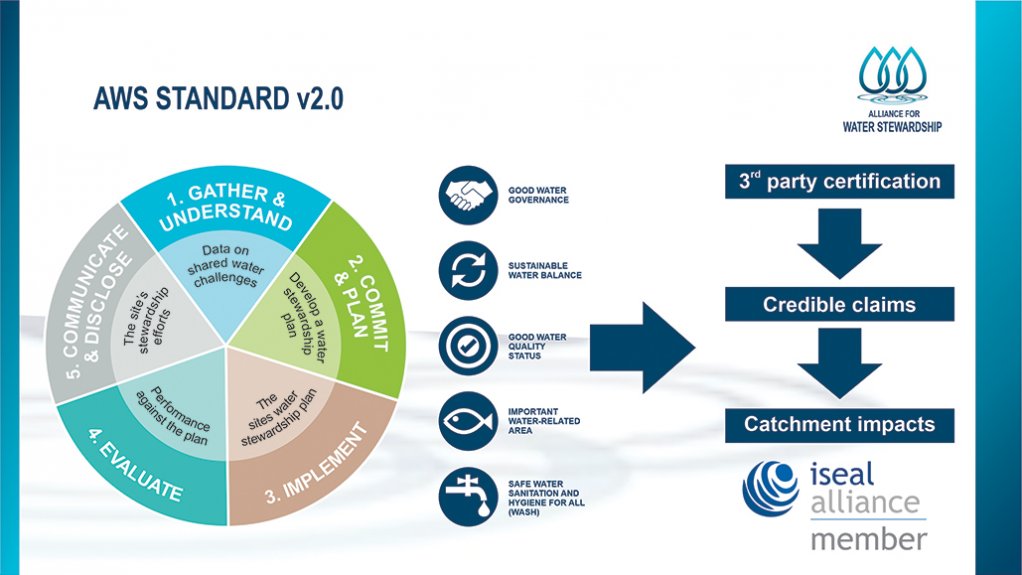With water security declining in South Africa, consulting engineers and scientists SRK Consulting principal consultant Fiona Sutton believes that securing commitment from companies regarding the value of water stewardship is the first step towards water security.
“Adhering to water stewardship can be done by implementing changes, such as applying on-site water-saving practices or better effluent treatment within a company’s production site and facility.”
SRK works with clients to raise awareness of the importance of water to inform their clients’ infrastructure and operations planning by identifying risks and opportunities.
Sutton adds that SRK’s technical expertise ranges from water quality and vulnerability assessments to river basin (or water catchment area) projects and pollution control. SRK promotes and supports the implementation of water stewardship in the policies and practices of clients.
This requires a detailed understanding of the source of the clients’ water, its quality and ecology, where and how it is being used on site, the impacts of that water use, the responsibilities for the water being used, water rights and how best to achieve water security, she explains.
SRK also helps clients to incorporate water stewardship into their supply chain, where they can make practical contributions to sustainability.
Sutton argues that incorporating water stewardship into a company’s supply chain is valuable “from a business point of view”, as consumers are attracted to companies that demonstrate a commitment to a more sustainable and water-secure future.
“Trust has become the ultimate currency in business today, with millennial consumers in particular driving the perception that business goals should include the improvement of society. ‘Profit with purpose’ is set to be a new social norm, and water stewardship is fundamental to this understanding – especially in water scarce countries like South Africa.”
Sutton explains that clients will initially focus their water stewardship efforts on their facilities, as this is where they have the most control to effect practical changes.
Understanding the water catchment area – as this is where water that supplies the local water system is sourced and where waste water is discharged – is vital in applying effective water stewardship principles.
“By taking the context of the catchment into account, water stewardship can be applied to any size business in any location, irrespective of its water source,” she adds.
Saving Tools
Sutton emphasises that global organisation the Alliance for Water Stewardship (AWS) provides water users with the International Water Stewardship standard that focuses on sustainable management and an improved understanding of water risks.
This standard enables companies to identify opportunities for improving the security and sustainability of their water supply, as well as water risks.
“The AWS standard goes beyond the fence-line and production site of a company, and looks at the whole catchment and supply chain. The advantage companies gain is sustainable water use – for the operation as well as for social responsibility interventions.”
She elaborates that the standard enables businesses to adopt a global framework so that they can be more proactive in examining water security at a site level.
Further, several SRK water professionals have received specialised AWS training; therefore, these professionals are equipped to help clients achieve AWS certification and improve corporate systems in terms of water sustainability.
“This certification confirms that a company has met the global benchmark for responsible water stewardship, which assures stakeholders within and outside of a company that the company’s claims of good water stewardship are credible.”
The AWS is also a member of global certification organisation the International Social and Environmental Accreditation and Labelling Alliance, which defines credible practice in sustainability based on emerging global consensus, says Sutton.
“As stakeholders from the private sector, public sector and civil society adopt their respective roles as water stewards, they can become more effective in jointly addressing complex water challenges,” she concludes.
Edited by: Zandile Mavuso
Creamer Media Senior Deputy Editor: Features
EMAIL THIS ARTICLE SAVE THIS ARTICLE
ARTICLE ENQUIRY
To subscribe email subscriptions@creamermedia.co.za or click here
To advertise email advertising@creamermedia.co.za or click here

















